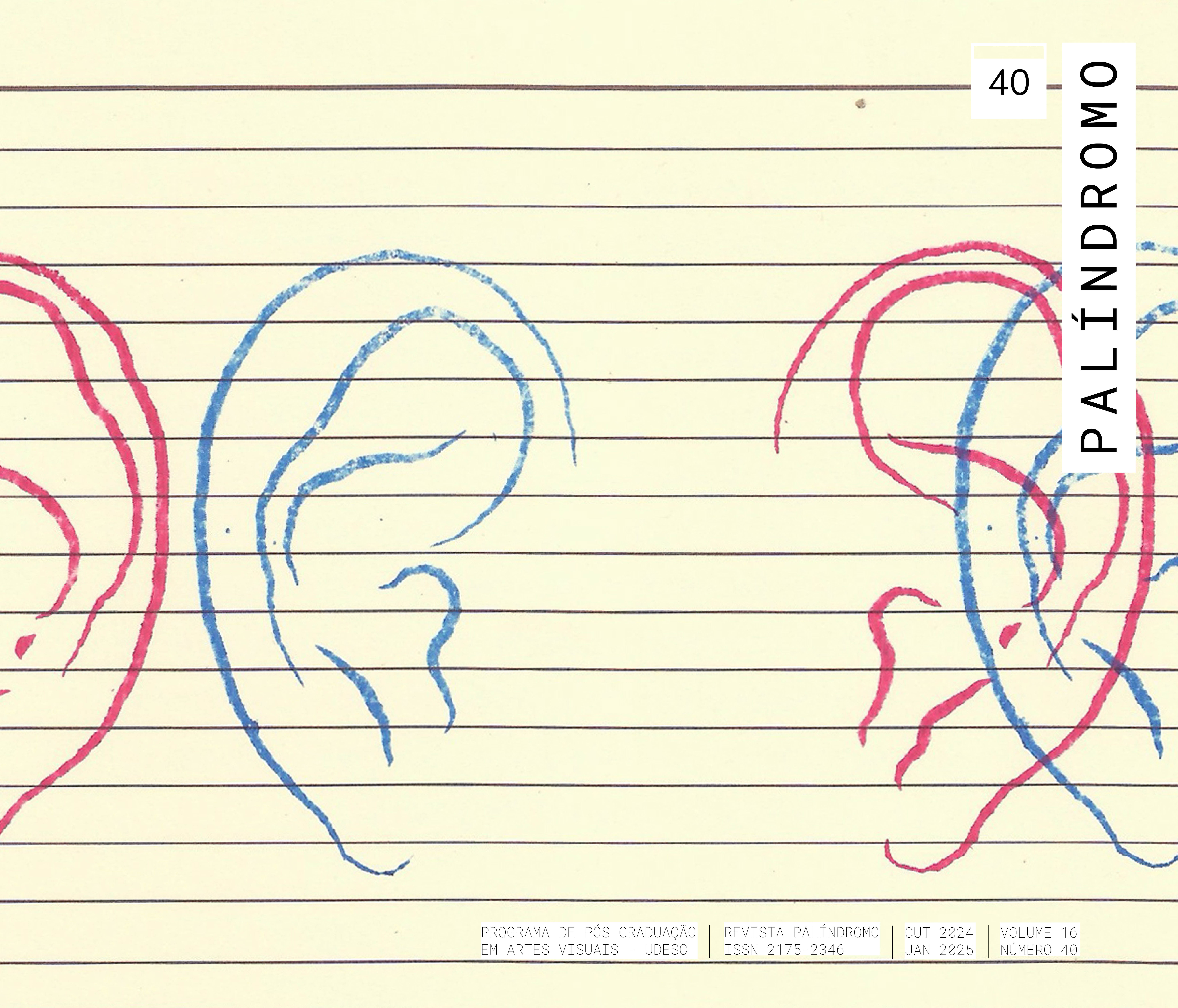Música Eletrovocal: erotismo, eletromagnetismos e vocalidades
DOI:
https://doi.org/10.5965/2175234616402024e0008Palavras-chave:
eletrovocal, música eletroacústica, erotismo, agenciamento, vocalidadesResumo
O conceito de “eletrovocal” (Bossi, 2005; Bosma, 2013; Mendes, 2018; Holmes, 2022), pode servir como gatilho para abordar aspectos de agenciamento de enunciação e erotismo, na utilização da voz na música eletrônica e eletroacústica, em especial vocalizada e composta por mulheres. O erotismo aqui é palavra ética para designar um sentido para componentes afetivos, incorpóreos, presentes nas trocas das relações, mas também nos materiais de sentido, no componentes heterogêneos entre som, voz, instrumentos e dispositivos tecnológicos. Está presente no sopro ressonante de vocalidade que incorpora o logos (Cavarero, 2014) e na palavra poética, segundo Octávio Paz (1994). Desejo e erotismo são potencias enquanto agência e agenciamento da voz e da eletrônica. Agenciamento como unidade real mínima que produz os enunciados, sempre coletivos, que põe em jogo, em nós e fora de nós, populações, multiplicidades, territórios, devires, afetos, acontecimentos. (Deleuze; Guattari, 1995).
Downloads
Referências
BERBERIAN, Cathy.The New Vocality in Contemporary Music. In: KARANTONIS, Pamela; PLACANICA, Francesca; et al (Org.). Cathy Berberian: Pioneer of Contemporary Vocality, trad. ing. Francesca Placanica. Farnham: Ashgate, 2014.
CAVARERO, Adriana: Vozes Plurais: Filosofia da Expressão Vocal. Belo Horizonte: Editora UFMG, 2011.
BOSMA, Hannah. The electronic cry: Voice and gender in electroacoustic music. Thesis, externally prepared, Universiteit van Amsterdam, 2013.
BOSMA, Hannah. Playing Loudspeakers, Unsettling Concerts, Gender and Performance in Interdisciplinary Electroacoustic Music. In: Proceedings of the Electroacoustic Music Studies Network Conference, Electroacoustic Music Beyond Performance, Berlin, June 2014. Disponível em: www.ems-network.org
BOSMA, Hannah. Authorship and Female Voices in Electrovocal Music. In: Proceedings of the International Computer Music Conference, Hong Kong, 1996.
DELEUZE, Gilles; GUATARRI, Félix. O que é Filosofia? São Paulo: Editora 34, 1992.
DELEUZE, Gilles; GUATARRI, Félix. Mil Platôs: capitalismo e esquizofrenia 2, vol. 2. Tradução de Ana Lúcia de Oliveira e Lúcia Claudia Leão. São Paulo: Editora 34, 1995.
DELEUZE, Gilles; GUATARRI, Félix. Mil Platôs: capitalismo e esquizofrenia, vol. 3. Tradução de Aurélio Guerra Neto, Ana Lúcia Oliveira, Lúcia Cláudia Leão e Suely Rolnik. São Paulo: Editora 34, 2012.
HOLDERBAUM, Flora Ferreira. Pensar as vozes, vocalizar o logos: das possibilidades de emergência de outras vocalidades. 2019, 333 p. Tese (Doutorado em Música/Sonologia), Escola de Comunicações e Artes, Universidade de São Paulo, São Paulo, 2019.
KARANTONIS, Pamela; PLACANICA, Francesca; et al (Org.). Cathy Berberian: Pioneer of Contemporary Vocality; trad. ing. Francesca Placanica. Farnham: Ashgate, 2014.
LORDE, Audre. Use of the Erotic: The Erotic as Power. In: Sister outsider: essays and speeches. New York: The Crossing Press Feminist Series, p. 53-59, 1984.
LIMA, Henrique Rocha de Souza. Da Música, de Mil Platôs : a intercessão entre filosofia e música em Deleuze e Guattari. 2013. 181 p. Dissertação (Mestrado em Filosofia). Instituto de Filosofia, artes e Cultura, Universidade Federal de Ouro Preto, Ouro Preto, 2013.
MENDES, Doriana. O discurso não-semântico na música eletrovocal. 2018, 224 p. Tese (Doutorado em Música). Instituto Villa-Lobos, Universidade Federal do Estado do Rio de Janeiro, Rio de Janeiro, 2018.
MELLO, Maria Ignez Cruz. Iamurikuma: música, mito e ritual entre os wauja do Alto Xingu. 2005, Tese, 335 p. (Doutorado em Antropologia Social). Centro de Filosofia e Ci-ências Humanas, Universidade Federal de Santa Catarina, Florianópolis, 2005.
OSMOND-SMITH, David. From words to Music. In: Berio. Oxford: New York: Oxford University Press, 1992.
PENHA, Gustavo; FERRAZ, Silvio. Cathy Berberian, Grock e as ideias de polifonia de ações, fragmentação textual, solfejo afetivo e humor em Sequenza III, para voz feminina, de Luciano Berio. Revista Vórtex, Curitiba, v.5, n.3, 2017, p.1-25.
PAZ, Octávio. A dupla chama: amor e erotismo. São Paulo: Siciliano, 1994.
SANTOS, Tatiana Nascimento. Textos escolhidos de Audre Lorde. Difusão Herética, zine, 2009. Disponível em: https://apoiamutua.milharal.org/files/2014/01/AUDRE-LORDE-leitura.pdf
Downloads
Publicado
Como Citar
Edição
Seção
Licença
Copyright (c) 2024 Flora Ferreira Holderbaum

Este trabalho está licenciado sob uma licença Creative Commons Attribution 4.0 International License.
DECLARAÇÃO DE DIREITOS AUTORAIS
a. Os artigos publicados pela revista são de uso gratuito, destinados a aplicações acadêmicas e não comerciais. Todos os direitos autorais são atribuídos à revista. Os artigos cujos autores são identificados representam a expressão do ponto de vista de seus autores e não a posição oficial da Revista Palíndromo. O (s) autor (es) compromete-se sempre que publicar material referente ao artigo publicado no Palíndromo mencionar esta publicação da seguinte forma:
Este artigo foi publicado originalmente pela revista Palíndromo em seu volume (coloque o volume), número (coloque o número) no ano de (coloque o ano) e pode ser acessado em: http://www.revistas.udesc.br/index.php/palindromo
b. Plágio, em todas as suas formas, constitui um comportamento antiético de publicação e é inaceitável. A revista Palíndromo utiliza o software iThenticate de controle de similaridade


